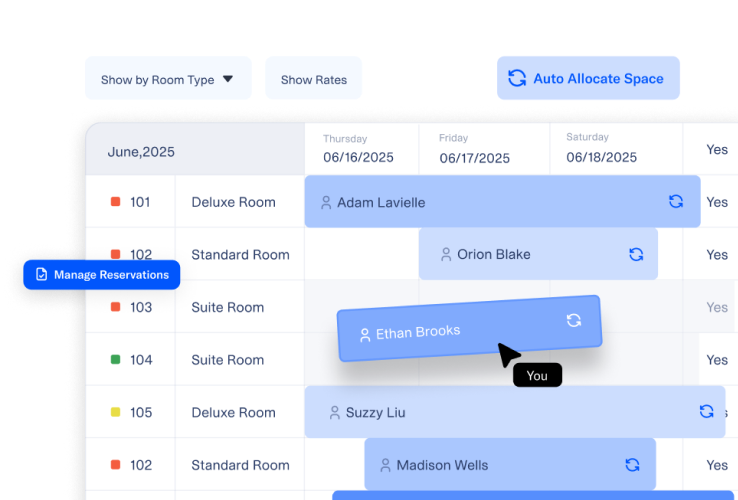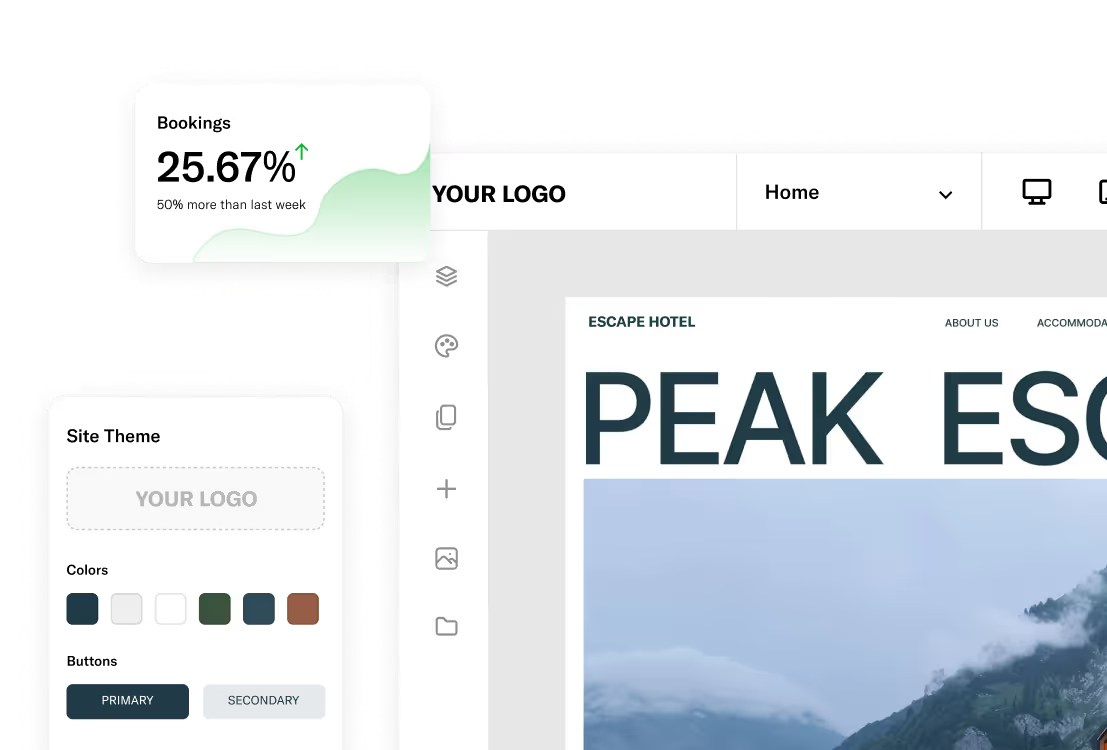Table of Contents
Join Thousands of Hotels Thriving with roommaster
The transition to roommaster is straightforward and efficient. Our implementation team handles data migration including reservations, guest profiles, and historical information.
Starting a hotel business is a chance to shape memorable experiences for travelers, contribute to local economies, and build a legacy in the hospitality industry. For aspiring hoteliers, the prospect of opening a hotel in 2026 is particularly exciting, given the dynamic shifts in travel trends, technological advancements, and consumer expectations.
The global hotel industry is flourishing, fueled by the growing popularity of niche markets like wellness retreats, eco-friendly accommodations, and experiential stays. Whether you envision managing a boutique property, a luxury resort, or a budget-friendly chain, understanding the essentials of the hospitality business is key to your success.
The hotel industry is entering a transformative era, with trends shaping how businesses operate and compete:
The hotel industry is much more than just providing a bed for the night. It involves creating experiences that keeps guests coming back. Whether it’s a family looking for a relaxing getaway, a business traveler needing efficiency, or a couple seeking luxury, the hotel business is about meeting diverse needs. To succeed, you need to grasp its multifaceted nature: from revenue management and marketing strategies to guest satisfaction and operational efficiency.
Knowing what type of hotel you want to establish is crucial to defining your business model and strategies:
Independent hotels operate without affiliation to a chain or brand, allowing for unique branding and personalized services. They often reflect the owner’s vision and the local culture, providing guests with distinctive experiences.
Example: A family-owned boutique hotel in Paris offering individually decorated rooms and personalized concierge services.
Resorts cater primarily to vacationers, offering extensive amenities such as pools, spas, dining options, and recreational activities. They focus on providing a comprehensive experience, encouraging extended stays.
Example: A beachfront resort in the Maldives featuring overwater villas, multiple restaurants, a spa, and water sports facilities.
B&Bs and inns are known for their intimate atmosphere and personalized service. They typically offer a limited number of rooms and include breakfast in the stay, appealing to travelers seeking charm and a personal touch.
Example: A countryside inn in Vermont with cozy rooms, homemade breakfasts, and a welcoming host eager to share local insights.
Hotel chains, or branded hotels, offer consistency and widespread recognition, making them ideal for business travelers and guests seeking reliable standards. Affiliating with a well-known brand can provide marketing support, established operational procedures, and a loyal customer base.
Example: Joining the Hilton brand to operate a Hilton Garden Inn in downtown Chicago, benefiting from Hilton’s global reservation system and brand recognition.
Park hotels cater to nature enthusiasts, offering accommodations near national parks or scenic locations. They provide guests with easy access to natural attractions and often incorporate eco-friendly practices.
Example: A lodge situated near Yellowstone National Park, offering guided tours, wildlife viewing opportunities, and sustainable lodging options.
When deciding on the type of hotel to establish, consider your target market, desired guest experience, location, and resources. Each category presents unique opportunities and challenges, so aligning your choice with your business goals is crucial for success.
Your niche defines the specific segment of the market you seek to serve. Ask yourself: Who are your ideal guests? What are they looking for? Whether it’s eco-conscious travelers, adventure seekers, or luxury connoisseurs, knowing your audience helps you align your services with their expectations.
In an industry as competitive as hospitality, your unique value proposition (UVP) is your standout promise to guests. This could be anything from offering an unbeatable location, specialized services like wellness programs, or the use of cutting-edge technology for seamless stays. A strong UVP helps differentiate your brand and builds long-term loyalty.
A solid business plan is the foundation of any successful hotel venture. It serves as your guide, defining every aspect of your hotel’s operations and vision. Key components include:
A well-crafted business plan will guide your decisions while strengthening your case when seeking funding from investors or financial institutions.
Financing is a critical step in making your hotel dream a reality. Options include:
Thoroughly assess your startup and operational costs, from construction to marketing, ensuring a realistic budget and financial strategy.
Location can make or break your hotel. Consider the following:
The design of your hotel should prioritize guest comfort and convenience. Key considerations include:
Eco-conscious guests are increasingly prioritizing sustainable stays. Here’s how to make your hotel green:
Sustainability practices can enhance your brand reputation and reduce operational costs over time, plus, you’re helping the planet!
Technology is a core aspect of modern hotel operations. Consider these integrations:
Starting a hotel business with technology at the foundation guarantees your hotel stays ahead in a competitive landscape.
{{pms-one}}
A strong Property Management System (PMS) is the backbone of efficient hotel operations. This software centralizes day-to-day activities such as room reservations, guest check-ins, and housekeeping management. With a PMS like roommaster, hoteliers can:
roommaster also features cloud accessibility, enabling hotel managers to oversee operations from anywhere.
Managing room inventory across multiple distribution channels can be challenging without the right tools. A Hotel Channel Manager ensures consistent availability and pricing across platforms like Booking.com and Expedia. With roommaster channel manager, hoteliers can:
{{booking-engine-one}}
Revenue management is crucial for maximizing profitability, especially in a competitive market. Advanced tools help hotels analyze booking trends and adjust rates in real-time. roommaster’s revenue optimization solutions offer:
Your staff is the heart of your hotel. Hiring team members who embody your brand values ensures guests receive exceptional service from check-in to check-out. In 2026, focusing on employee training is paramount as technology adoption grows.
Key strategies include:
Today’s guests seek unique and unforgettable experiences. Whether it’s personalizing welcome amenities or hosting exclusive local events, delivering standout experiences builds loyalty and generates word-of-mouth referrals.
To enhance guest satisfaction:
A robust marketing plan is the backbone of any successful hotel launch. Begin by identifying your target audience and crafting messaging that speaks to their preferences and travel needs. Outline a detailed budget, allocate resources for various channels, and establish key performance indicators (KPIs) to measure success. Include strategies like paid ads, organic content, and loyalty programs to maximize reach and retention.
Social media platforms like Instagram, TikTok, and LinkedIn are essential for showcasing your hotel’s personality and services. Post visually stunning content, such as room tours and behind-the-scenes stories, to engage potential guests. Partnering with travel influencers can boost credibility and extend your reach. Use Instagram Reels or TikTok trends to make your hotel stand out in a crowded market.
{{hotel-website-builder}}
When designing your online presence, your website should reflect your hotel’s unique value proposition. The roommaster Hotel Website Builder platform provides pre-built, customizable templates tailored to the hospitality industry. These templates are mobile-friendly, feature intuitive navigation, and are optimized for conversions, take a look at them:
Starting a hotel business requires a thorough understanding of local regulations, including zoning laws, permits, and tax obligations. Compliance with health and safety standards, accessibility requirements, and data privacy laws like GDPR is critical. To simplify the process, consider consulting legal experts who specialize in hospitality to ensure all bases are covered.
Securing initial funding can be one of the biggest challenges for new hoteliers. Whether through bank loans, private investors, or government grants, you’ll need a clear financial plan.
Finding and retaining skilled staff is vital for delivering exceptional guest experiences. Invest in proper training and create a positive work environment.
When planning to scale, consider market demand and guest preferences in new locations. Expand your brand identity while maintaining the unique elements that distinguish your hotel. Partnerships with other businesses or franchises can also accelerate growth.
Monitor industry trends like sustainability and contactless services to stay relevant. Leverage tools like roommaster’s Channel Manager to maintain consistent pricing across platforms, preventing overbookings and maximizing occupancy.
Future-proofing your business requires a combination of innovation and adaptability. Invest in technology upgrades and prioritize guest loyalty programs to encourage repeat bookings. With a focus on continuous improvement and strategic planning, your hotel will remain competitive for years to come.
How to start a hotel business? Starting a hotel business is a journey filled with opportunities, challenges, and rewards. Aspiring hoteliers must focus on crafting a clear vision, leveraging innovative technology, and staying guest-centric. Success comes from meticulous planning and adaptability.
Success in the hotel industry depends on a combination of excellent service, effective marketing, and operational efficiency. Leveraging technology like a PMS or channel manager can help optimize performance and enhance guest satisfaction.
Location is critical to a hotel’s success. Proximity to tourist attractions, business centers, and transportation hubs can increase bookings and revenue.
{{cta-strip}}



The transition to roommaster is straightforward and efficient. Our implementation team handles data migration including reservations, guest profiles, and historical information.
See how roommaster's unified platform can work for your property. Our team will walk you through features tailored to your specific needs and operations.